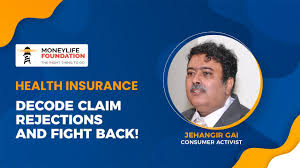Insurance Claim Rejection Truth by Jehangir Gai; Addressing the unfair practices that insurance companies often employ against policyholders

Quick Overview
Consumer activist Jehangir Gai delivered an insightful talk at a Moneylife Foundation event, addressing the unfair practices that insurance companies often employ against policyholders. He highlighted common challenges faced by consumers in navigating the complex landscape of health insurance claims, and he provided practical advice on how policyholders can effectively advocate for their rights.

Key Points
- Unethical Practices in Insurance: Gai discussed various unfair practices, such as arbitrary claim rejections and manipulation of policy clauses, that insurers frequently use to minimize payouts.
- Legal Rights of Policyholders: He emphasized that policy terms cannot be altered without the explicit consent of the policyholder and highlighted recent legal rulings that support consumer rights.
- Insurance Ombudsman System: Gai critiqued the insurance ombudsman system, noting its potential for bias and inconsistency in decision-making, while also recognizing it as a quicker alternative to court.
- Consumer Protection Act: The complexities introduced by the 2019 amendments to the Consumer Protection Act have led to inefficiencies in claim processing, according to Gai.
- Practical Advice for Policyholders: Gai provided actionable tips for consumers, including the importance of understanding policy terms, maintaining thorough documentation, and knowing how to challenge unfair claim denials.
Jehangir Gai began his talk by shedding light on the various unethical practices that plague the insurance industry. He pointed out that many insurance companies engage in arbitrary claim rejections and exploit vague policy clauses to their advantage. One alarming example he provided was the use of the ‘reasonability clause’, which allows insurers to unilaterally reduce claim amounts without adequate justification. For instance, a policyholder’s legitimate hospital bill of Rs33,000 was slashed to Rs10,000, showcasing how insurers manipulate such clauses to avoid full payouts.
Gai also addressed the issue of claims being denied due to minor delays in document submissions, which often stem from an inefficient system rather than the policyholder’s negligence. He firmly stated that once a policy is issued, it should be renewed under the original terms as long as premiums are paid on time, emphasizing that unilateral changes by insurers are unacceptable.
Legal Rights of Policyholders
Gai provided valuable insights into the legal landscape surrounding health insurance claims. He referenced a landmark ruling in the case of United India Insurance v/s Jay Prakash Tayal, in which the Delhi High Court prohibited insurers from denying claims based on genetic conditions, declaring such exclusions contrary to public policy. This ruling, currently under review by the Supreme Court, is binding in Maharashtra and other states with no conflicting judgments.
He stressed the importance of policyholders understanding their rights, particularly in light of legal precedents that support their claims. Gai advised that consumers should not hesitate to challenge unfair decisions, as they are protected by consumer laws.
Insurance Ombudsman System
Gai offered a balanced critique of the insurance ombudsman system, acknowledging its potential as a speedy remedy for disputes but cautioning against possible biases. He shared a compelling anecdote about four doctors whose identical claims were rejected due to delays in processing. While three doctors had their claims dismissed by the ombudsman, the fourth doctor, represented by Gai, received 50% of the claim amount despite facing an antagonistic ombudsman. This disparity in outcomes highlighted the inconsistent nature of ombudsman rulings.
He advised policyholders to approach the ombudsman as a first step but also be prepared to escalate their cases to consumer forums, where outcomes tend to be more equitable. Gai reminded attendees that the ombudsman’s decision is not final and can be challenged.
Consumer Protection Act
Gai discussed the complications introduced by the 2019 amendments to the Consumer Protection Act, which shifted the basis of jurisdiction from claim amounts to consideration paid (such as premiums). This change has led to overcrowded district forums and significant delays in processing claims. He illustrated this point with an example of an insurance policy with a modest premium that could now allow claims of up to Rs10 crore to be filed at the district level, ultimately clogging the system.
He expressed concerns about the appointment process for consumer forum members, noting that many experienced officials were replaced by less qualified individuals during the COVID-19 pandemic. This situation has led to legal challenges regarding the legitimacy of these appointments, currently stayed by the Supreme Court.
On a positive note, Gai acknowledged an amendment that allows complaints to be filed at the consumer’s place of residence or work, which enhances accessibility. However, he cautioned that systemic inefficiencies and delays have worsened since the amendments were introduced.
Practical Advice for Policyholders
In the final segment of his talk, Gai provided practical advice for policyholders to navigate the insurance landscape effectively. He stressed the importance of thoroughly reading insurance policies before signing, emphasizing that understanding terms and conditions can prevent disputes later on. He advised consumers to keep meticulous records of all communications with insurers, as this documentation can serve as critical evidence in case of disputes.
In cases of unfair decisions or claim denials, Gai encouraged policyholders to challenge the decisions, starting with the ombudsman. While the ombudsman system has its flaws, it offers a quicker alternative to court. If necessary, disputes can be escalated to consumer forums, although Gai warned that this process can be time-consuming and complicated due to the recent amendments.
He also highlighted the importance of understanding limitation periods for filing complaints, noting that the clock starts ticking from the date the insurer sends its final rejection notice. This knowledge can make a significant difference in ensuring timely action.

Final Takeaways
Jehangir Gai’s talk served as a wake-up call for policyholders to be proactive in understanding their rights and navigating the complexities of the insurance claims process. Key takeaways include:
- Be Informed: Understanding policy terms and conditions is crucial to avoiding disputes.
- Document Everything: Keeping detailed records of communications with insurers can provide essential evidence in case of disputes.
- Challenge Unfair Decisions: Policyholders have the right to contest claim denials and should utilize the ombudsman system as a first step, escalating to consumer courts if necessary.
- Stay Alert: Being aware of limitation periods for filing complaints can prevent unnecessary delays in the claims process.
Overall, Gai’s insights empower policyholders to advocate for their rights and navigate the often challenging insurance landscape with confidence.